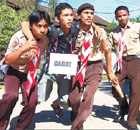Asia-Pacific
China-Japan scholars' report likely in January
By Cheng Guangjin (China Daily)
Updated: 2009-12-28 08:17
 |
Large Medium Small |
Those who are keen to read the complete results of three years of joint research into the long-disputed issues in the history of China and Japan have to wait for another month, Chinese scholars who joined the research announced over the weekend.
Twenty-six research papers, half composed by Chinese scholars and half by their Japanese counterparts, will be published as early as next month. The first phase of the joint research concluded on Dec 24 after 10 Chinese and 10 Japanese scholars met for the fourth time in Tokyo.
| ||||
The scholars said the two sides postponed the release of details for fear of arousing nationalistic sentiments by simplifying the research conclusions without the full contents, which reflect the complexity of historical disputes in China-Japan relations. By next month the translation and compiling will be finished, they said.
But they highlighted the statements made by the Japanese scholars in their papers regarding the nature of the Sino-Japanese War of 1931-45, which they admitted to be Japan's invasion into China, according to Bu.
"They admitted the illegal acts committed by the Japanese army in the war had caused the huge sacrifice of Chinese civilians, which hampered the building of new relationship between the two countries after the war," Bu said.
Bu said the Japanese scholars also admitted in the papers that "the lawsuits in recent years over germ warfare, chemical weapons left in China, forced labor and violence on women all reflected the deep scar left by the war on the Chinese people."
However, "China is not seeking revenge but the aim of studying history is eyeing for the future", stressed Tao Wenzhao, one of the Chinese researchers on the project and a US studies expert at CASS.
"We both want to turn to a new page in our relationship, but the Japanese leaders should keep a consistent stance in respecting the history," said Tao.
When anti-Japan sentiments inside China reached a climax in 2005, the Japanese government proposed the joint research project to China and the two governments sponsored 20 scholars to start the project in December 2006, with a goal to improve bilateral ties, said Bu.
With current Japanese Prime Minister Yukio Hatoyama's pro-China policy and the reiterated appeal to create an East Asia Community (EAC), "China and Japan should solve their historical disputes or the EAC would only be a fantasy," said Bu.
On an earlier occasion, Feng Zhaokui, former deputy head of the institute of Japan Studies at CASS, compared the EAC with the European Union (EU), whose progress has owed much to the solving of historical conflicts between France and Germany left by World War II .
"China and Japan have much to learn from the example set by France and Germany," Bu agreed.
Whether to admit the Nanking Massacre in Japanese history text books has been a concern to Japan's right-wing forces, who seek to deny the historical fact and the number of casualties in the massacre, the scholars said.
The Nanking Trial in 1947 confirmed the death toll at over 300,000 and the Tokyo Trial in 1948 set it at over 200,000, said Bu. The mainstream Japanese people have already recognized this, the Chinese scholars said.
The scholars said it is a "comfort" that in the past three years the Chinese and Japanese scholars have been able to sit down together and discuss these historical issues calmly and rationally.










